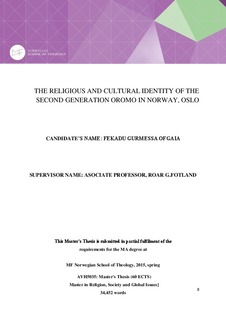The Religious and Cultural Identity of the Second Generation Oromo in Norway, Oslo
Master thesis
Permanent lenke
http://hdl.handle.net/11250/293616Utgivelsesdato
2015-07-27Metadata
Vis full innførselSamlinger
Sammendrag
Today there are a large number of Oromo migrants worldwide. There are many in Western Europe, particularly in Norway, Oslo. They fled their homeland because of political instability, economic insecurity and human rights violations. Oromo migrants' experiences differences cultural norms in foreign culture. But they took their religion and cultural identity and establish churches to worship God in the Oromo language to preserve the religious and cultural identity and social life of the Oromo people in Norwegian social context. Hence the thesis wants to investigate the cultural and religious identity of the Oromo migrant children or second generation Oromo in Oslo
The thesis goes on to examine the impact of parents' cultural identity, and the modern Norwegian cultural norms on the second generation of Oromo in Norway, Oslo and their reaction to both cultures by formulating research and interview questions to conduct an in-depth interview techniques to find the answer to the research question
In the migration process acculturation is playing an important role. In acculturation context several changes are taking place; that cultural change and adaptation of ideals, values and behavior of the recipient culture, and also retention of ideals, values and beliefs of migrant person culture of origin. However, most of the second generations Oromo in Norway, Oslo are obtain bicultural identity.
